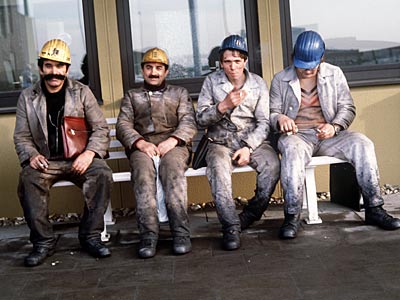Turks in Germany, calling nationalilty into question again
It is a complicates issue, as I wrote recently, identifying oneself in the hyphenation-happy categorization rampant in within the notion of modern American nationality. But as has long been touted, this is not an all bad phenomenon. Yes, it puts people in oftentimes artificial categories, Chinese-Americans born here still caught awkwardly between a culture they have grown up in and the culture of their ancestors, which collide in their homes and schools and jobs. Japanese-Americans taking desperate measures in WWII to ensure to their neighbors that they, too, are Americans in this--and Arab-Americans who have spent the last decade being reminded of that 1940s episode. Hispanic Americans who today get stuck in the middle of an immigration battle and animosity towards an ever-larger Spanish speaking minority and the threat of linguistic heterogeneity.
Yet there is enough of a belief among Americans to have ensured that through everything, we have made ourselves more multicultural today, even if it surely provides plenty of demons for us to face in our public lives (battles over where to build a mosque, for instance, or absurdly, the President's ethnic origins).
 The United States is not alone, for certain. Consider the xenophobia that just as often plagues European nations, like Germany's fifty-year troubled relationship with its Turkish immigrants, beginning with the Recruitment Treaty of 1961, when Turkish people moved to Germany as workers in building West Germany's "economic miracle"--its massive growth at this time. Many stayed, much to the chagrin of Germany nationals. Chancellor of Germany Angela Merkel came out and said recently that multiculturalism in Germany had "utterly failed." This clash of nationals against immigrants was the subject of a recent story on The World, where correspondent Matthew Brunwasser quotes a gentleman named Cerel, who says the problem at the core of the relationship today is that "Germans expect Turks in assimilate, not integrate. In other words, to be indistinguishable from Germans."
The United States is not alone, for certain. Consider the xenophobia that just as often plagues European nations, like Germany's fifty-year troubled relationship with its Turkish immigrants, beginning with the Recruitment Treaty of 1961, when Turkish people moved to Germany as workers in building West Germany's "economic miracle"--its massive growth at this time. Many stayed, much to the chagrin of Germany nationals. Chancellor of Germany Angela Merkel came out and said recently that multiculturalism in Germany had "utterly failed." This clash of nationals against immigrants was the subject of a recent story on The World, where correspondent Matthew Brunwasser quotes a gentleman named Cerel, who says the problem at the core of the relationship today is that "Germans expect Turks in assimilate, not integrate. In other words, to be indistinguishable from Germans."
Says Cerel: "There was always xenophobia in Germany, but right now it's mainstream, it's uttered in a situation where Turks are so integrated as they have never been before. That's not a good sign." Turks have been deemed a scapegoat for German woes, but Turks are beginning to look back towards their native Turkey, as their homeland is booming, while Germany is not looking nearly as rosy. The economy of Turkey is expected to grow 7 percent this year, more than twice that of Germany's, according to the news story.
Yet Brunwasser goes on to say, such a tormented relationship has created the feeling among some Turks of being an outcast in both countries--being in one long enough to no longer identify as strongly with your native culture, but clearly still looking like a foreigner in your adopted land. This is a very nearly universal phenomenon in immigrant groups (indeed, very often even if you are relocating within your own country, but far enough removed from your cultural roots). What often happens as well, is that the citizens of the adopted country often know little about their immigrant populations' cultures and traditions for quite some time, engendering misunderstandings and racial prejudices based on stereotypes for far too long.
Brunwasser concludes: "The mono-ethnic countries of Europe don't have hyphenated identities, like America. You're either a German, or a foreigner. Though if today's demographic and economic trends continue, Germany, and Europe as a whole, could be forced to change."
I say with confidence, that line "could be forced to change" most surely hides the larger truth: will be forced to change. Or even, simply, (hopefully,) will change. The U.S. has its own immense multicultural shortcomings and the hyphenated nationality is arguably one of them; but I appreciate and value it compared to the alternative.
